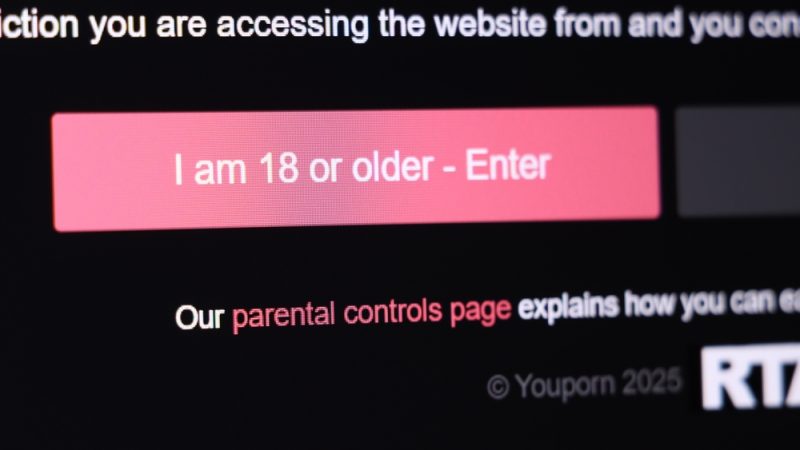
Child safety seems like one of those policy no-brainers. After all, no politician is going to come out and say they don’t support it. Yet, remarkably, it has become an incredibly divisive issue when applied to the online space.
Reading articles on the OSA, you could be forgiven for thinking it is, as Farage states, a repressive symptom of a so-called “nanny state.” But this could not be further from the intentions behind the Bill.
The clue is very much in the name – it’s about safety – and its purpose is to make it easier to take down illegal content, such as Child Sexual Abuse Material, along with restricting access for vulnerable groups, such as children, to harmful content like pornography, suicide and self-harm promotion.
Unfortunately, this important context is often lost in the Faragian bluster around state overreach, erosion of free speech, and warnings of a police state.
READ MORE: ‘We must clean up social media before it poisons our democracy’
Let’s be clear: Farage is no champion of free expression. His record is one of seeking to delegitimise the voices he doesn’t like, from migrants to LGBTQ+ people to political opponents. For him, “freedom of speech” is a shield for his own views and those who agree with him, not a universal principle.
That’s why it is misleading to portray public concerns about the OSA as if they are simply echoes of Farage’s rhetoric. People who contacted me with concerns about the Act do not, in the main, share his libertarian brand of politics; they want the Act strengthened in ways which will better protect their privacy and freedoms.
At a roundtable I convened with experts and local residents, the discussion underscored this point. Everyone agreed on the importance of child safety, but participants were also concerned about how the Act could work in practice.
READ MORE: ‘Labour can’t ignore the Online Safety Act’s harms – it must act to fix them’
The most pressing issue was privacy, with many people questioning the reliability of third-party age-verification firms, which are often based overseas and operate questionable security standards.
There was also anxiety about “over-blocking”, with constituents highlighting the censorship of small LGBTQI+ forums, along with well-established media and internet resources e.g. Wikipedia and BBC reports on Gaza. Faced with the threat of heavy fines, there is clearly a risk that some platforms might err on the side of caution and strip out valuable content that is neither illegal nor harmful.
And then there are the market implications. Large tech companies may be able to shoulder the compliance burden, but smaller platforms and non-profits risk being regulated out of existence. That would entrench monopoly power and reduce diversity online, diminishing our digital spaces.
Subscribe here to our daily newsletter roundup of Labour news, analysis and comment– and follow us on Bluesky, WhatsApp, X and Facebook.
These concerns are not about rejecting child safety: parents, young people, and campaigners in Edinburgh want safer online spaces, but they also want the Act to enshrine safeguards that will respect privacy, and protect marginalised voices, and small innovators.
This is where Farage’s rhetoric rings particularly hollow: he is very happy to rail against “state overreach”, but he offers no solutions beyond “repeal the Bill” – an act which would be a monumental error.
The truth is that the OSA is not an assault on our freedoms, and those expressing genuine concerns are not anti-child safety. There is nuance, and it is important that we allow the Act to evolve to ensure children are absolutely protected.
Civil society groups will have a vital role in monitoring for over-censorship and ensuring that Ofcom enforces the Act proportionately, whilst dealing with any overreach. Parliament, too, must remain vigilant, making sure this legislation cannot be misused by future governments of any stripe.
Often when legislation is passed, we view that as the end of the conversation, but in the case of the Online Safety Act, I think we should see it as the beginning. It will only succeed if it is implemented in a way that protects children in the face of any workarounds without silencing communities, and Farage has shown he cannot be relied upon to do either.
Share your thoughts. Contribute on this story or tell your own by writing to our Editor. The best letters every week will be published on the site. Find out how to get your letter published.
-
- SHARE: If you have anything to share that we should be looking into or publishing about this story – or any other topic involving Labour– contact us (strictly anonymously if you wish) at [email protected].
- SUBSCRIBE: Sign up to LabourList’s morning email here for the best briefing on everything Labour, every weekday morning.
- DONATE: If you value our work, please chip in a few pounds a week and become one of our supporters, helping sustain and expand our coverage.
- PARTNER: If you or your organisation might be interested in partnering with us on sponsored events or projects, email [email protected].
- ADVERTISE: If your organisation would like to advertise or run sponsored pieces on LabourList‘s daily newsletter or website, contact our exclusive ad partners Total Politics at [email protected].




More from LabourList
SPONSORED: ‘Industrial hemp and the challenge of turning Labour’s priorities into practice’
‘A day is a long time in politics, so we need ‘action this day’’
Strong support for child social media ban among Labour members, poll reveals